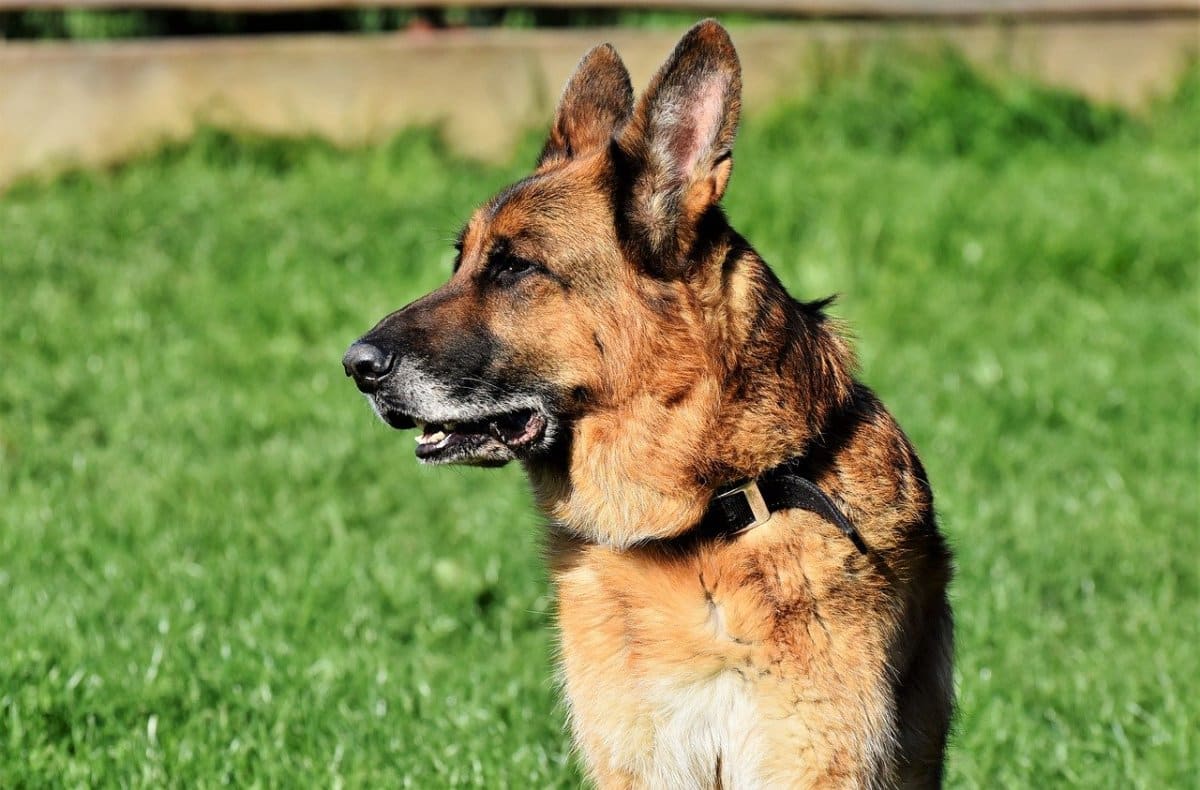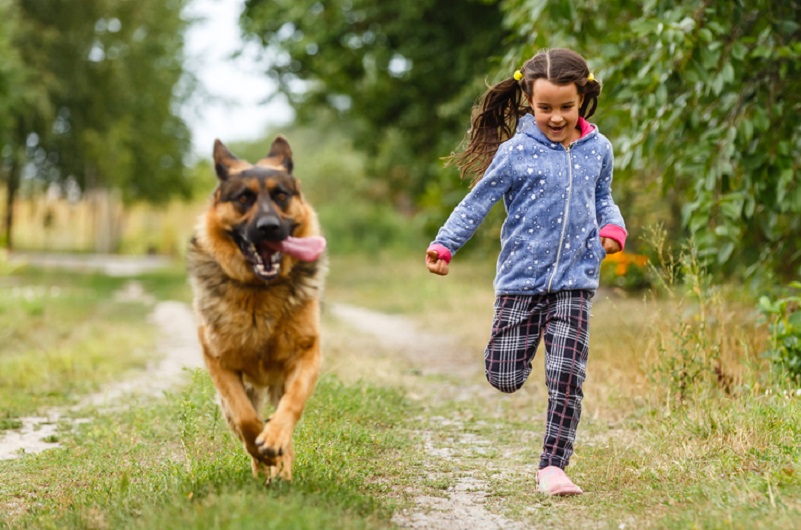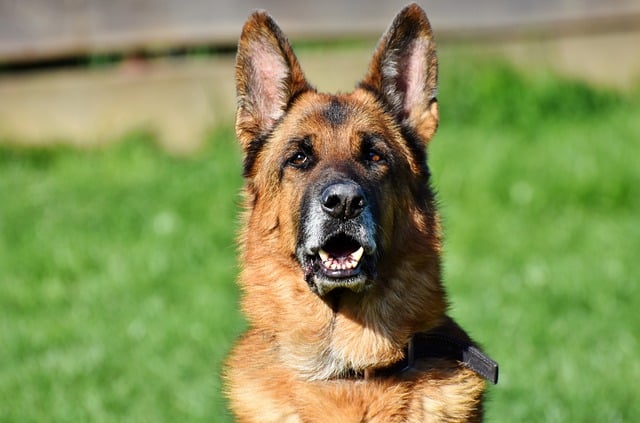
German Shepherds typically live between 9 to 13 years, making them a medium lifespan breed. This breed is known for its intelligence, loyalty, and versatility, serving in various roles such as police dogs, search and rescue dogs, and family companions.
German Shepherds require proper nutrition, regular exercise, and regular veterinary care to live a long and healthy life. Additionally, genetics, environment, and overall care also play a crucial role in determining a German Shepherd’s lifespan. Providing a loving and stimulating environment can contribute to their longevity, while neglect and poor living conditions can shorten their lifespan.
Therefore, it is important to understand the average lifespan and take appropriate steps to ensure the well-being of your German Shepherd.
Average Lifespan Of German Shepherds
As devoted companions and highly intelligent working dogs, German Shepherds hold a special place in the hearts of many pet owners. Understanding the average lifespan of German Shepherds is crucial when considering adding one to your family. By knowing the various factors that can impact their lifespan and being aware of common health issues, you can take appropriate steps to ensure a long and healthy life for your German Shepherd.
Factors Affecting The Lifespan Of German Shepherds
Several factors can influence the lifespan of German Shepherds. By considering these factors and taking proactive measures, you can enhance their longevity.
- Nutrition: Providing a well-balanced and nutritious diet plays a crucial role in the overall health and longevity of German Shepherds. A diet consisting of high-quality ingredients, including lean protein, healthy fats, and essential nutrients, can help support their immune system and prevent various health issues.
- Exercise and Mental Stimulation: Regular exercise and mental stimulation are essential for the physical and mental well-being of German Shepherds. Engaging them in activities like daily walks, playtime, and training sessions helps to maintain their physical fitness and prevents obesity, which can shorten their lifespan.
- Genetics: German Shepherds, like many other dog breeds, can be predisposed to certain genetic conditions and diseases. Responsible breeding practices and genetic testing can help minimize the risk of inherited health issues, promoting a longer and healthier life.
- Veterinary Care: Regular visits to the veterinarian for check-ups, vaccinations, and preventive treatments are essential to detect and address any health concerns early on. Prompt and appropriate medical care can greatly impact the lifespan of German Shepherds.
- Environmental Factors: The environment in which your German Shepherd lives can also affect their lifespan. Provide them with a safe and clean living space, protect them from extreme weather conditions, and avoid exposing them to toxic substances to ensure their well-being.
Common Health Issues That May Impact Their Lifespan
German Shepherds are generally a healthy breed, but they may be prone to certain health issues that can impact their lifespan. Being aware of these common ailments and taking preventive measures can contribute to their longevity. Some common health issues include:
| Health Condition | Description |
|---|---|
| Degenerative Myelopathy | A progressive disease that affects the spinal cord, leading to a gradual loss of mobility. |
| Hip and Elbow Dysplasia | An abnormal development of the hip or elbow joints, causing pain and reduced mobility. |
| Exocrine Pancreatic Insufficiency (EPI) | A condition where the pancreas fails to produce sufficient digestive enzymes, resulting in malnutrition. |
| Chronic Degenerative Radiculomyelopathy (CDRM) | A neurodegenerative disease that affects the spinal cord and causes weakness and paralysis. |
NOTE: It is important to remember that not all German Shepherds will develop these conditions, and early detection and proper management can significantly improve their quality of life and lifespan.
Tips To Increase The Lifespan Of German Shepherds
German Shepherds can live a long and healthy life by following these tips: provide balanced nutrition, regular exercise, regular vet check-ups, proper dental care, mental stimulation, and a safe environment. This breed typically has a lifespan of 9 to 13 years on average.
The lifespan of German Shepherds can vary depending on several factors, including genetics, overall health, and lifestyle. While their average lifespan ranges from 9 to 13 years, it is possible to increase their lifespan and ensure they live a long and healthy life. In this section, we will explore some essential tips that can help maximize the lifespan of German Shepherds.Proper Nutrition And Balanced Diet For Longevity
One of the key factors in increasing the lifespan of German Shepherds is providing them with a proper nutrition and a balanced diet. Feeding your German Shepherd with a high-quality dog food that meets their nutritional requirements is crucial. This includes a mix of proteins, healthy fats, carbohydrates, vitamins, and minerals. A well-balanced diet helps support their immune system, maintain a healthy weight, and prevent obesity-related health issues. Additionally, it is essential to provide fresh water at all times and avoid overfeeding, as obesity can lead to various health problems.Regular Exercise And Physical Activity Recommendations
German Shepherds are highly active dogs that require regular exercise and physical activity to stay fit and healthy. Engaging in daily exercise not only helps keep their weight in check but also stimulates their muscles and joints, promotes cardiovascular health, and improves overall well-being. To increase the lifespan of your German Shepherd, aim for at least one hour of exercise per day. This can include activities such as brisk walks, jogging, playing fetch, or participating in dog sports like agility or obedience training. Regular exercise not only helps keep them physically fit but also provides mental stimulation, reducing the risk of behavioral issues.Importance Of Mental Stimulation And Enrichment
In addition to physical exercise, mental stimulation and enrichment are equally important for German Shepherds. These intelligent and highly trainable dogs thrive on mental challenges and stimulation. Engaging their minds helps prevent boredom and keeps their cognitive abilities sharp, ultimately contributing to their longevity. Incorporate activities like puzzle toys, interactive games, obedience training sessions, and scent detection exercises into their daily routine. Providing them with opportunities to learn new tricks and engage in problem-solving tasks not only keeps them entertained but also strengthens the bond between you and your German Shepherd. By following these tips focused on nutrition, exercise, and mental stimulation, you can significantly increase the lifespan of your German Shepherd. Remember, a healthy and well-balanced lifestyle, along with regular veterinary check-ups, will ensure your furry friend lives their best life for as long as possible.Recognizing Signs Of Aging In German Shepherds
As German Shepherds age, they go through various physical and behavioral changes. Recognizing these signs is crucial for providing appropriate care and ensuring their well-being. In this section, we will discuss the typical age-related changes in behavior and appearance, as well as provide tips for providing the best care for aging German Shepherds.
Typical Age-related Changes In Behavior And Appearance
As German Shepherds enter their senior years, they tend to exhibit certain changes in behavior and appearance. It’s essential to be aware of these changes so that you can address them appropriately.
- Reduced energy levels and activity. Your once energetic German Shepherd may become less enthusiastic about exercise and playtime.
- Increased sleeping and napping. Seniors typically need more rest, and your German Shepherd might spend more time snoozing throughout the day.
- Behavioral changes such as irritability, confusion, or anxiety. Older dogs might become more easily agitated or experience cognitive decline.
- Incontinence issues. Your German Shepherd may have difficulty controlling their bladder or bowel movements.
- Diminished hearing and vision. It’s common for seniors to experience some degree of hearing and vision loss.
- Graying fur and loss of coat color. Just like humans, German Shepherds’ fur may start turning gray or fade in color as they age.
- Weight gain or loss. Senior German Shepherds may have a harder time maintaining a healthy weight, which can result in either weight gain or loss.
- Loss of muscle mass and strength. Your aging German Shepherd may start to exhibit a decrease in muscle tone and strength.
- Joint stiffness and mobility issues. Arthritis and joint problems can become more apparent as your dog gets older.
How To Provide Appropriate Care For Aging German Shepherds
1. Regular veterinary check-ups: Schedule regular check-ups with your veterinarian to monitor your German Shepherd’s health and address any age-related issues or concerns.
2. Balanced nutrition: Feed your senior German Shepherd a balanced and age-appropriate diet to ensure they receive the necessary nutrients for their changing needs. Consult your veterinarian for guidance on the best diet for your dog.
3. Exercise and mental stimulation: While your aging German Shepherd may not have the same energy as before, it’s still important to provide regular exercise and mental stimulation. Adjust the intensity and duration of activities to match their capabilities.
4. Comfortable living environment: Make sure your German Shepherd’s living environment is comfortable and easily accessible. Provide a soft bed or orthopedic mattress to support their joints and ease any discomfort.
5. Regular grooming: As your German Shepherd ages, they may require more regular grooming to maintain their coat and skin health. Brush their fur regularly and trim their nails to prevent any issues.
6. Special attention to dental health: Oral health is important at any age. Pay close attention to your senior German Shepherd’s dental care by regularly brushing their teeth and providing appropriate dental treats or toys.
7. Patience and understanding: Understand that your aging German Shepherd may need more patience and understanding as they navigate the challenges associated with getting older. Providing them with love, attention, and a supportive environment can greatly enhance their quality of life.
Promoting A Healthy Lifestyle For German Shepherds
As a responsible owner, it is crucial to prioritize the health and well-being of your German Shepherd. This intelligent and loyal breed deserves a long and happy life, which can be achieved by promoting a healthy lifestyle. By focusing on regular veterinary check-ups and preventive care, grooming practices, and training and socialization, you can ensure that your German Shepherd thrives both physically and mentally. Let’s delve into each aspect in detail.
Regular Veterinary Check-ups And Preventive Care
Regular veterinary check-ups are essential to maintaining your German Shepherd’s overall health and detecting any potential issues early on. Just like humans, dogs require regular medical attention to stay healthy. Ideally, you should schedule annual check-ups with your veterinarian, who will perform a thorough examination and address any concerns you may have. These appointments allow you to monitor your German Shepherd’s weight, dental health, and vaccination status, ensuring that they are up to date with any necessary vaccinations. Additionally, your veterinarian may recommend preventive measures such as flea and tick control, heartworm prevention, and routine deworming to keep your dog safe from potential health hazards.
Grooming Practices To Maintain Their Overall Well-being
Grooming is not just about keeping your German Shepherd’s coat clean and shiny; it is also an essential aspect of their overall well-being. Regular grooming sessions allow you to bond with your dog and keep a close eye on their physical condition. Brushing their coat regularly not only helps to remove loose hair and prevent matting but also promotes healthy skin and blood circulation. German Shepherds are known for their double coat, which means they shed extensively, especially during spring and fall. By investing in a high-quality brush, you can reduce shedding and minimize the amount of hair around your home. Additionally, regular nail trims, ear cleaning, and dental care are crucial to prevent discomfort and potential infections. Consult with your veterinarian or a professional groomer to establish a grooming routine that suits your German Shepherd’s specific needs.
Training And Socialization For A Happy And Healthy Life
Training and socialization play a pivotal role in shaping your German Shepherd’s behavior and ensuring a happy and healthy life for them and those around them. German Shepherds are highly intelligent and thrive when provided with mental stimulation and structure. Enrolling your dog in basic obedience classes can help establish a foundation of good behavior, teaching them essential commands and promoting socialization with other dogs and people. Consistent training sessions at home, coupled with positive reinforcement techniques, will strengthen the bond between you and your German Shepherd while also preventing behavioral problems. Regular exercise, such as daily walks or engaging in dog sports like agility, can also contribute to their overall well-being by keeping them physically fit and mentally stimulated. Remember, a well-trained and socialized German Shepherd is a happier, confident, and well-adjusted companion.
Creating A Safe And Supportive Environment For German Shepherds
German Shepherds are known for their loyalty, intelligence, and versatility. These beautiful creatures are not just pets, but beloved family members. As responsible pet owners, it is our duty to provide them with the best possible care, especially as they age. By creating a safe and supportive environment, we can ensure that our German Shepherds live long, happy, and healthy lives. Let’s explore some important aspects of this, starting with home modifications for senior German Shepherds.
Home Modifications For Senior German Shepherds
As German Shepherds age, their needs change. It’s essential to make necessary home modifications to accommodate their unique requirements. Here are a few important considerations:
- Provide easy access: Install ramps or stairs to help your senior German Shepherd navigate elevated areas such as stairs, couches, or beds. This reduces the strain on their joints and minimizes the risk of injuries.
- Ensure slip-free floors: Place rugs or mats in areas with slippery surfaces to prevent your senior German Shepherd from losing balance and suffering from falls. This is especially important for them, as they may face challenges with mobility.
- Optimize their sleeping arrangements: Invest in a comfortable and supportive dog bed that caters to their specific needs. Look for orthopedic beds that provide joint support and relieve pressure points, allowing them to sleep soundly and wake up refreshed.
Providing A Comfortable Living Space For Their Specific Needs
A comfortable living space plays a vital role in the overall well-being of your German Shepherd. Consider the following tips to ensure their comfort:
- Create a designated space: Set aside an area in your home exclusively for your German Shepherd. This space should have their bed, water bowl, toys, and some room for them to move around comfortably. This helps establish their personal territory and provides them with a sense of security.
- Maintain optimal temperature: German Shepherds are sensitive to extreme temperatures. Ensure that the living space is neither too hot nor too cold. It’s crucial to provide adequate heating or cooling to keep them comfortable throughout the year.
- Provide mental stimulation: German Shepherds are intelligent breeds that thrive on mental stimulation. Include interactive toys, puzzle games, and regular training sessions to keep their minds sharp and prevent boredom or destructive behaviors.
Monitoring And Managing Potential Hazards For A Longer Lifespan
Creating a safe environment extends beyond physical modifications. It also involves being vigilant and proactive in identifying and managing potential hazards that could impact your German Shepherd’s longevity. Here are some key points to consider:
- Regular veterinary check-ups: Schedule regular vet visits to monitor your German Shepherd’s health and catch any potential issues early on. This way, you can provide appropriate medical care and ensure your furry friend has the best chance at a long and healthy life.
- Proper nutrition: Feed your German Shepherd a balanced and age-appropriate diet to support their overall health. Consult your veterinarian to determine the right type and amount of food for your senior German Shepherd.
- Safety-proof your home: Remove any toxic plants, secure electrical cords, and ensure that hazardous substances like cleaning products are stored out of your German Shepherd’s reach. This minimizes the risk of accidental poisoning or injuries.
By making these modifications and being proactive in ensuring a safe and supportive environment, you can enhance your German Shepherd’s quality of life and help them enjoy their golden years to the fullest. Remember, a safe and comfortable environment creates the foundation for a healthy and happy life for your beloved German Shepherd.

Credit: vetericyn.com
Frequently Asked Questions Of How Long Does German Shepherds Live?
How Long Do German Shepherds Typically Live?
German Shepherds typically live between 9 to 13 years on average. However, with proper care, diet, and exercise, they have been known to live up to 15 years or more. It’s important to keep them at a healthy weight, provide regular veterinary check-ups, and ensure they get enough mental and physical stimulation to promote a long and fulfilling life.
What Factors Can Affect A German Shepherd’s Lifespan?
Several factors can influence a German Shepherd’s lifespan. Genetics play a significant role, so choosing a reputable breeder is crucial. Other factors include the dog’s overall health, diet, exercise, and living conditions. Adequate veterinary care, proper nutrition, regular exercise, and a safe and stimulating environment all contribute to a German Shepherd’s potential for a longer life.
How Can I Extend My German Shepherd’s Lifespan?
To extend your German Shepherd’s lifespan, it’s important to prioritize their health and well-being. Provide them with regular exercise, a balanced diet, and mental stimulation through interactive toys and training. Regular veterinary check-ups and vaccinations are also essential in identifying and preventing potential health problems.
Lastly, consider their living conditions, ensuring a safe and comfortable environment.
Can German Shepherds Live Longer With Specific Diet Requirements?
While a healthy diet is crucial for a German Shepherd’s overall well-being, there is no specific diet requirement that guarantees a longer lifespan. However, feeding them a high-quality dog food formulated for their specific needs, such as protein-rich meals with essential vitamins and minerals, can contribute to their longevity.
It’s always best to consult with your veterinarian for personalized diet recommendations for your German Shepherd.
Conclusion
To summarize, German Shepherds have a relatively long lifespan, typically ranging from 9 to 13 years. Factors such as genetics, diet, exercise, and medical care can influence their longevity. By providing them with proper care, attention, and a healthy lifestyle, you can ensure they live a happy and fulfilled life.
Remember, each German Shepherd is unique, so it’s essential to monitor their health closely and consult with a veterinarian regularly.

